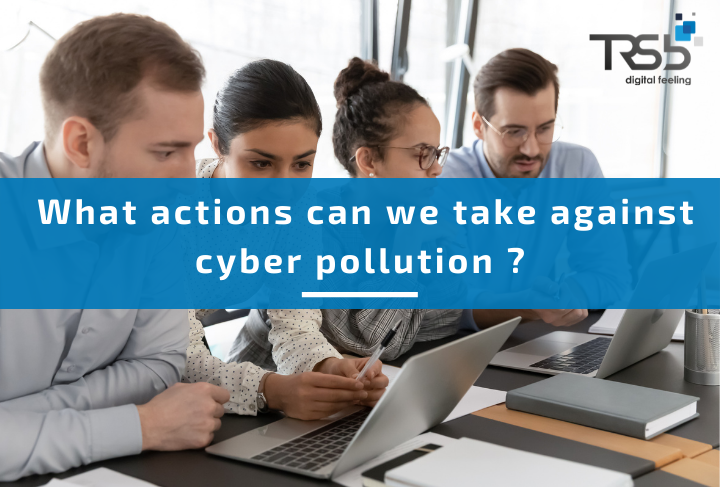The cyber world and internet are generating very little visible waste. However, for a few years now, the companies and the society have started to realise that it creates an invisible pollution.
Non classé
31 March 2022

The cyber world and internet are generating very little visible waste. However, for a few years now, the companies and the society have started to realise that it creates an invisible pollution.
Though invisible, cyber pollution is very real. Here are some figures and key numbers :
Knowing that less than half of the world population has access to internet, those numbers could rise drastically in the years to come.
Using internet consumes energy. However, we can limit our impact when online.
First of all, a good practice is to avoir clicking on mutliple link to go to one website. It much less costly to type directly the website adress in the search bar when possible. It divides by four the greenhouse gas emissions.
Moreover, 4G is 23 times more energy intensive than Wi-Fi. With 5G coming, the consumption will certainly rise. Anytime you can, prefer Wi-Fi over data. You can also unable your location on your phone which will avoid constant and useless data transfer.
Finally, every search engines are not the same. Yahoo, Google or Bing need no introduction but you can use greener alternatives. Ecosiafor example plants tree for every research and 80% of its ad income is uses in reforestation actions.
E-mails are a big source of pollution. As said earlier, in a day, it’s 293 billions of e-mails that were exchanged in 2019. When we know that it produces on average 19 grammes of CO2, it makes you think. Of course, the use of e-mail is nowaday essential for most workers, there are some good practices.
First of all, clear your inbox ! A saved e-mail generate on average 10 grammes of CO2 per year. The heavier it is, the more energy intensive it is. Do not hesitate to clear your inbox every year and to deleter your older or heavier e-mails. It can also be the time where you unsubscribe from all there newsletter that you never read !
When sending an e-mail, if you can, compress your attached documents or use dowloading links. Also you should target your audience. : by reducing the number of recipient, you reduce the carbon foot print of your e-mail.
Finally, on a more general note, you can also use instant chat tools which are less energy intensive.
The most energy intensive part will always be our equipment. Composed with many plastic materials, precious and heavy metal that travel all around the world before being put together in most of the time a far away contry before coming to Europe, the building of computer equipments is more often than not, very costly for the planet.
For starter, take care of your equipment : unplug the battery once your device is charged so that you don’t damage it, if you’re gonna be inactive for more than an hour, turn it off… If despite your care, it breaks down, think of repair before replacing. Check you guarantee or try to see if they have a repair policy.
Finally, a smartphone is supposed to last approximatly 10 years. However, an average consumer changes it every 9 months. Resist the call and appeal of the last trendy phone and try reconditonned devices, always less costly and more ecological.
TRSb, as a digital player has an important role to play in raising awareness on those matters.
For all these reasons, TRSb has signed in 2020 the Planet Tech Care Manifesto and is comitted to a greener IT. It takes an important part in our CSR Strategy and the actions that we implement within our company.
This year for the World Cyber Clean Up Day, our teams were on board to reduce our impact online !
Finally, we are watchful regarding the end-of-life of our equipment. Devices are recycled when unusable and given to charity when it can be reused.